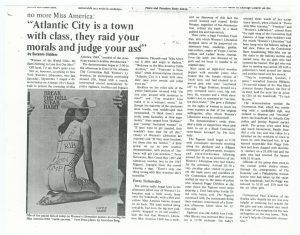You Don’t Own Me” by Lesley Gore (1963)
Teenager and singer-songwriter Lesley Gore released the song “You don’t Own Me” in 1963 that represented strong themes of feminism and sent out strong positive messages of freedom to women across the country. In her song, she addresses an unknown figure and states that she is not owned by the individual and he/she cannot tell her what to do. The purpose of this song seems to be to promote a sense of freedom in women during the time period and to promote the feeling of individuality in these women. She also sings about the individual not putting her on display and to not lay her down because she will never stay which seems to have a sexual connotation and is attacking sexism that was prominent in the country at the time. The source is important in defining the roles of women during the 1960’s and how many women felt the need to speak out against sexism and unequal rights for women due to the presence of second-wave feminism in the women’s liberation movement.
Women’s Liberation Demonstration (1968)

This source is a photograph of just one of the numerous protests that occurred during the years of the women’s liberation movement. The photo shows a crowd of women marching and protesting for their rights in New York City in 1968 during an equal rights demonstration holding up signs that represent the unity of women at the time period. The protests were a backlash against the community, specifically the government due to unfair laws and regulations against women. The women’s liberation movement and sexual revolution occurred during the late 1960’s and women across the country were protesting for change. Women made an effort to speak out and fight for a variety of rights that included women’s rights in the workplace and increased sexual freedom such as acceptance of queer sexuality. This photo shows the women’s want for liberation during the time period and the strong desire they had to gain equal rights and be liberated from certain roles they were placed into as a result of traditional values stemming from the Victorian Era.
“Atlantic City Is a Town with Class, They Raid Your Morals and Judge Your Ass.” (1968)

See Source Here: https://repository.duke.edu/dc/wlmpc/maddc02020
The source is an article written in 1968 by Suzanne Giddens which discusses the occurrences during the Miss America march that occurred in Atlantic City criticizing and going against the Miss America Pageant on September 7th of 1968. The article attacks the way women are viewed and the way they were treated at the march. The article includes a photo of a woman with lines drawn around her and body parts labeled with cuts of meat emphasizing the prevalence of sexism during the late 1900’s. This article is crucial for understanding women’s struggle against sexism and the desire to free themselves from stigmas such as women being viewed as objects during the women’s liberation movement. Although women were making progress in sexual freedom, there were steps in the wrong direction in which women felt that they were being over sexualized and needed to speak out against this sexist scrutiny.
